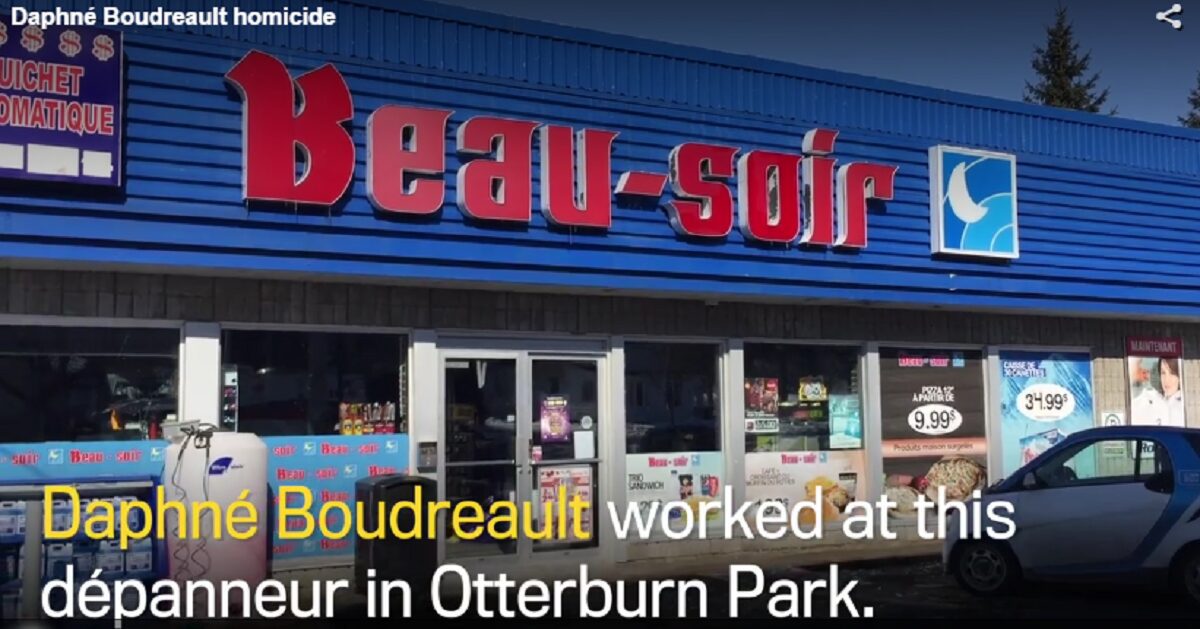Monastesse didn’t know Daphné Boudreault, but upon learning that the 18-year-old may have been a casualty of domestic violence, she was overcome with a sense of loss.
“It breaks you, you see it as a failure,” said Monastesse, who has spent her 25-year career helping women escape spousal abuse. “There’s no equivocating, there’s no rationalizing it, one dead woman is one too many. … You can’t see it any other way than this: we failed this person.
“Somewhere along the line, someone — whether it’s the police or another front line worker — could have done something to prevent this.”
The day after Boudreault was killed in Mont-St-Hilaire Wednesday, the victim’s friends asked a much more pointed question: could police have done more to prevent the homicide?
Boudreault died the day after she ended a two-year relationship with Anthony Pratte-Lops — a 22-year-old who has since been charged with first degree murder. The suspect attacked Boudreault with a “sharp object” in the basement apartment they shared, according to a Sûreté du Québec spokesperson.
Earlier that day, Boudreault called police after Pratte-Lops showed up at her work. Colleagues say she was shaking, sobbing and that she told them she feared for her life.
When the officers arrived at the dépanneur Boudreault worked at Wednesday, they judged Pratte-Lops not to be a threat and sent him home in a taxi, colleagues said. Boudreault would go to the apartment later that day to collect her belongings.
There are conflicting accounts as to whether police from the Régie intermunicipale de police Richelieu-Saint-Laurent escorted her to the apartment, but their treatment of the case is being investigated by the Bureau des enquêtes indépendantes. The BEI normally investigates officer-involved shootings and experts say their probe into the Boudreault case suggests a potential breach of police protocol.
“From what I can gather, it seems like the police didn’t evaluate the situation properly,” said Monastesse, the director general of the Fédération des maisons d’hébergements pour femmes — a group that encompasses 36 women’s shelters throughout Quebec.
“There are directives in how police have to handle conjugal violence and I don’t think they were followed. When you have a situation where a woman fears for her life, priority No. 1 is you assure the victim’s safety.
“It also seems like, when police arrived at (the dépanneur), they didn’t separate (Boudreault) from (Pratt-Lops) and that’s another big mistake. If you interview them when they’re right next to each other and she’s terrified, she’s terrorized by him, she won’t give accurate testimony.
“If that’s what happened, it’s just absolutely unacceptable. It’s just completely inappropriate police protocol.”
Monastesse says that if Boudreault had been interviewed alone, she could have provided officers with enough evidence to place her ex-boyfriend under arrest instead of sending him back to the apartment.
In cases of suspected domestic violence, there’s clear protocol in place to protect the alleged victim. Provincial guidelines dictate that at least two officers must accompany the victim who fears for her safety when she’s retrieving belongings from her home.
One officer is meant to stay with each partner during the process.
For years, Monastesse has worked with police departments in Quebec to develop the best practices for handling cases of domestic violence. Her organization helped Montreal police develop a checklist called “Memory Aid to Prevent a Homicide.”
Among the key questions officers are trained to ask, it would appear that many applied in Boudreault’s case. Boudreault and her boyfriend had recently broken up, colleagues claim she feared for her safety, they claimed that Pratte-Lops was jealous and did not allow her to have friends.
Pratte-Lops posted a video on Facebook Wednesday claiming he’d hacked into her phone and found evidence she was cheating on him. All of these factors are mentioned in the Montreal police’s checklist.
“There were many red flags,” said Monastesse.
Conjugal violence remains a common and under-reported phenomenon, Monastesse said. In Quebec, an average of 17 women a year are killed by their partner each year, according to data from the Public Security Ministry.
The 36 Fédération des maisons d’hébergements pour femmes shelters have enough room to accommodate nearly 500 women. But each year, the occupancy rate in these shelters exceeds 90 per cent. And yet, only 19 per cent of the women who use these shelters report their abuser to police.
“A lot of women are afraid they won’t be taken seriously and that their case won’t be treated seriously,” said Monastesse. “I don’t want to wrap police over the knuckles here because we’ve made a lot of progress over the years. But when you hear about how (Boudreault’s) case was handled, it raises some important questions.
“When something like this happens, it breaks your heart. Our whole mandate is for the victims of conjugal violence to be heard, to be believed and to be supported the right way. Every time something like this happens, it disturbs you, it shocks you and you see it as a failure.”
Paru dans The Gazette

